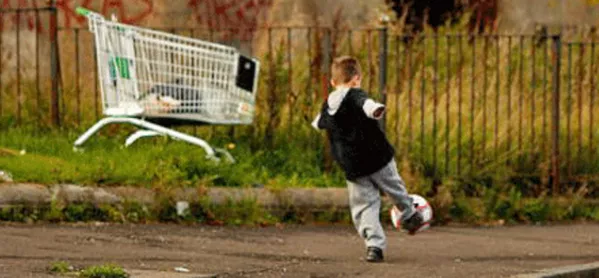It truly is a sobering thought that in the year 2106, according to the Child Poverty Action Group, we have more than 3.7 million children living in poverty in the UK. Translated to an “average” class, this means 28 per cent of pupils - or nine in a class of 30 - are living in poverty. We all know we do not live in an “average” country, which means this proportion is higher in certain schools and lower in others.
Indeed, some areas approach the 100 per cent mark. This can and does impose an enormous burden on some schools and some teachers.
Every day, schools up and down the country attempt, very successfully, to support childen with the plethora of issues which are hidden behind such figures, but, nonetheless, can anyone call this an acceptable situation?
In the summer of 2000 there was an article entitled “A vision of riches” which appeared in TES. It was based around the issues faced at the school where I was the headteacher, and still am. This was a school in the bottom 10 per cent of deprivation in the country. Upon rereading this article recently, as well as realising I hadn’t aged as well as I had thought, I was shocked by the similarity in data over that time span.
In 2000, one in three of our children was living in poverty in the area. Over half were on income support and the level of special needs was high, as was the figure for free school meals. Sixteen years later, and after expensive governmental policies such as Sure Start, surely the overall picture has improved?
Sadly, the figures for this year are almost completely unchanged. This is probably true up and down the country - a fact that doesn’t say much for governmental policy.
Most schools in our situation strive to ensure all our students, whatever their backgrounds, are supported and achieve the best possible education. However, there is no doubt that we have to provide many extras, and face many more challenges, and perhaps we just need this to be recognised. For example, as we leave Sats season, we all know this data is the only data recognised by Ofsted. How sad is that?
‘The situation seems to be getting bleaker’
Daily we have to deal with cases of abuse, complex special needs, emotional and behavioural problems, plus children arriving with low baseline entry and very low self-esteem. We then feed them before school, often clothe them and then as a team work relentlessly to ensure each individual feels supported and is able to attempt to achieve their potential.
Every day I feel as if I am seeing the situation getting bleaker.
Why is there no national debate about the poverty we are faced with daily? How is it that we accept we are 22nd in the league table of relative child poverty among the world’s richest countries?
Why isn’t this a source of national disgust?
Schools that support our most vulnerable children have undoubtedly dedicated teachers always willing to go the extra mile. They are continually under pressure to succeed and to achieve often the near-unachievable.
The profound inequality throughout or country shows itself most explicitly in our schools. Isn’t it time to stop talking about educational structural change, or curriculum change or the endless testing regime?
Isn’t it time to address the real problems facing us? The fact that we have far too many children arriving at our schools hungry, poorly dressed and with difficult home situations? These children struggle to benefit from what many schools can offer. The unpalatable truth is that the norm for so many children is not acceptable in 2016. Is it going to change in the years to come? I do hope so.
Colin Harris is headteacher of Warren Park Primary School in Havant, Hampshire
Want to keep up with the latest education news and opinion? Follow TES on Twitter and like TES on Facebook




